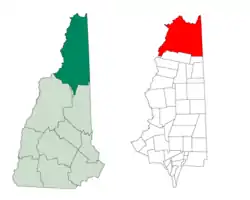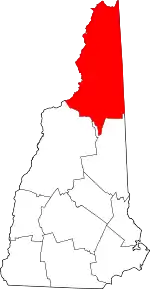Pittsburg, New Hampshire
Pittsburg is a town in Coös County, New Hampshire, United States. The population was 800 at the 2020 census.[2] It is the northernmost town in New Hampshire and the largest town by area in New England. U.S. Route 3 is the only major highway in the town, although the northern terminus of New Hampshire Route 145 also lies within Pittsburg.
Pittsburg, New Hampshire | |
|---|---|
 Park in Pittsburg | |
 Location in Coös County, New Hampshire | |
| Coordinates: 45°03′04″N 71°23′29″W | |
| Country | United States |
| State | New Hampshire |
| County | Coös |
| Incorporated | 1840 |
| Named for | William Pitt, 1st Earl of Chatham |
| Villages | Pittsburg Happy Corner Idlewilde |
| Government | |
| • Board of Selectmen |
|
| Area | |
| • Total | 291.3 sq mi (754.5 km2) |
| • Land | 281.3 sq mi (728.6 km2) |
| • Water | 10.0 sq mi (25.8 km2) 3.43% |
| Elevation | 1,322 ft (403 m) |
| Population (2020)[2] | |
| • Total | 800 |
| • Density | 3/sq mi (1.1/km2) |
| Time zone | UTC−5 (Eastern) |
| • Summer (DST) | UTC−4 (Eastern) |
| ZIP code | 03592 |
| Area code | 603 |
| FIPS code | 33-61780 |
| GNIS feature ID | 0871099 |
| Website | www |
Pittsburg is part of the Berlin, New Hampshire–Vermont Micropolitan Statistical Area.
History
Pittsburg derives its name from William Pitt, Prime Minister of Great Britain.[3] Prior to its incorporation in 1840, the area was settled c. 1810 and known as the Territory of Indian Stream. It had the unique distinction of having been its own microstate briefly during the 1830s, called the Republic of Indian Stream, due to an ambiguous boundary between the United States and Canada.[3]
The Indian Stream Schoolhouse on Tabor Road, which dates to 1897, is listed in both the National Register of Historic Places and the New Hampshire State Register of Historic Places; the town hall on Main Street, which dates to 1883, is listed in the State Register.[4]
Geography
Pittsburg shares an international border with Québec province, Canada, to its west and north, and borders the states of Maine (to the east) and Vermont (a very small portion to the southwest). Directly to the south is Clarksville, New Hampshire. Pittsburg is the only New Hampshire municipality to border Canada, the only one that borders both Maine and Vermont, the only one to share a land border with Vermont, and the only town entirely north of the 45th parallel. Pittsburg contains the only part of New Hampshire west of the Connecticut River, as that river defines the Vermont state line from Clarksville southward. The Pittsburg–Chartierville Border Crossing, New Hampshire's only Canadian border crossing, is located in the town, at the northern terminus of U.S. Route 3. The western edge of Pittsburg is defined by Halls Stream, being the "northwesternmost headwaters of the Connecticut River", which defined (ambiguously) the border in the Treaty of Paris of 1783.
Contained within the boundaries of Pittsburg are the Connecticut Lakes, which form the beginning of the Connecticut River. Early maps (e.g. 1854) also show several grants that were incorporated into the eastern edge of Pittsburg, including Carlisle No. 1, Webster/Carlisle No. 2 and Hubbards No. 3, all north of Atkinson and Gilmanton Academy Grant.
According to the United States Census Bureau, the town has a total area of 291.3 square miles (754.5 km2), the largest in New Hampshire and New England of any municipality incorporated as a town. 281.3 square miles (728.6 km2) of Pittsburg are land and 10.0 square miles (25.8 km2) are water, the latter comprising 3.43% of the town.[1]
The highest point in Pittsburg is the summit of Stub Hill, at 3,627 feet (1,106 m). Mount Magalloway, elevation 3,383 feet (1,031 m), is a prominent summit reachable by hiking trail.
Climate
According to the Köppen Climate Classification system, First Connecticut Lake has a warm-summer humid continental climate, abbreviated "Dfb" on climate maps. The hottest temperature recorded at First Connecticut Lake was 93 °F (33.9 °C) on July 8, 1921 and July 19, 1953, while the coldest temperature recorded was −45 °F (−42.8 °C) on February 1, 1920.[5]
| Climate data for First Connecticut Lake, New Hampshire, 1991–2020 normals, extremes 1918–present | |||||||||||||
|---|---|---|---|---|---|---|---|---|---|---|---|---|---|
| Month | Jan | Feb | Mar | Apr | May | Jun | Jul | Aug | Sep | Oct | Nov | Dec | Year |
| Record high °F (°C) | 60 (16) |
64 (18) |
77 (25) |
83 (28) |
91 (33) |
91 (33) |
93 (34) |
92 (33) |
89 (32) |
83 (28) |
72 (22) |
63 (17) |
93 (34) |
| Mean maximum °F (°C) | 45.3 (7.4) |
47.5 (8.6) |
55.0 (12.8) |
70.5 (21.4) |
79.9 (26.6) |
84.5 (29.2) |
85.1 (29.5) |
83.6 (28.7) |
80.6 (27.0) |
71.6 (22.0) |
61.1 (16.2) |
49.4 (9.7) |
87.0 (30.6) |
| Average high °F (°C) | 22.4 (−5.3) |
25.2 (−3.8) |
34.2 (1.2) |
47.1 (8.4) |
61.5 (16.4) |
70.4 (21.3) |
75.0 (23.9) |
73.6 (23.1) |
66.4 (19.1) |
52.8 (11.6) |
39.9 (4.4) |
28.7 (−1.8) |
49.8 (9.9) |
| Daily mean °F (°C) | 11.1 (−11.6) |
12.8 (−10.7) |
21.9 (−5.6) |
36.3 (2.4) |
49.9 (9.9) |
59.3 (15.2) |
64.2 (17.9) |
62.7 (17.1) |
55.1 (12.8) |
43.5 (6.4) |
31.8 (−0.1) |
19.9 (−6.7) |
39.0 (3.9) |
| Average low °F (°C) | −0.3 (−17.9) |
0.4 (−17.6) |
9.6 (−12.4) |
25.5 (−3.6) |
38.3 (3.5) |
48.3 (9.1) |
53.4 (11.9) |
51.7 (10.9) |
43.9 (6.6) |
34.1 (1.2) |
23.7 (−4.6) |
11.1 (−11.6) |
28.3 (−2.0) |
| Mean minimum °F (°C) | −27.0 (−32.8) |
−24.6 (−31.4) |
−18.5 (−28.1) |
6.6 (−14.1) |
25.1 (−3.8) |
32.6 (0.3) |
40.7 (4.8) |
38.4 (3.6) |
28.7 (−1.8) |
19.6 (−6.9) |
4.6 (−15.2) |
−14.0 (−25.6) |
−30.0 (−34.4) |
| Record low °F (°C) | −44 (−42) |
−45 (−43) |
−36 (−38) |
−17 (−27) |
14 (−10) |
25 (−4) |
29 (−2) |
28 (−2) |
18 (−8) |
8 (−13) |
−13 (−25) |
−44 (−42) |
−45 (−43) |
| Average precipitation inches (mm) | 3.02 (77) |
2.37 (60) |
3.04 (77) |
3.60 (91) |
4.47 (114) |
5.14 (131) |
4.91 (125) |
4.76 (121) |
4.00 (102) |
4.63 (118) |
3.62 (92) |
3.57 (91) |
47.13 (1,199) |
| Average snowfall inches (cm) | 30.3 (77) |
28.4 (72) |
24.6 (62) |
9.7 (25) |
1.0 (2.5) |
0.0 (0.0) |
0.0 (0.0) |
0.0 (0.0) |
0.0 (0.0) |
2.5 (6.4) |
14.6 (37) |
31.9 (81) |
143.0 (363) |
| Average extreme snow depth inches (cm) | 22.3 (57) |
27.9 (71) |
29.4 (75) |
16.9 (43) |
0.9 (2.3) |
0.0 (0.0) |
0.0 (0.0) |
0.0 (0.0) |
0.0 (0.0) |
1.2 (3.0) |
6.9 (18) |
14.9 (38) |
30.6 (78) |
| Average precipitation days (≥ 0.01 in) | 18.3 | 14.6 | 15.2 | 15.0 | 14.6 | 15.2 | 14.8 | 14.1 | 12.1 | 15.5 | 16.7 | 19.3 | 185.4 |
| Average snowy days (≥ 0.1 in) | 16.8 | 13.5 | 11.5 | 5.3 | 0.7 | 0.0 | 0.0 | 0.0 | 0.0 | 1.7 | 8.6 | 15.5 | 73.6 |
| Source 1: NOAA[6] | |||||||||||||
| Source 2: National Weather Service[5] | |||||||||||||
Demographics
| Census | Pop. | Note | %± |
|---|---|---|---|
| 1840 | 315 | — | |
| 1850 | 425 | 34.9% | |
| 1860 | 413 | −2.8% | |
| 1870 | 400 | −3.1% | |
| 1880 | 581 | 45.3% | |
| 1890 | 609 | 4.8% | |
| 1900 | 687 | 12.8% | |
| 1910 | 624 | −9.2% | |
| 1920 | 1,311 | 110.1% | |
| 1930 | 671 | −48.8% | |
| 1940 | 820 | 22.2% | |
| 1950 | 697 | −15.0% | |
| 1960 | 639 | −8.3% | |
| 1970 | 726 | 13.6% | |
| 1980 | 780 | 7.4% | |
| 1990 | 901 | 15.5% | |
| 2000 | 867 | −3.8% | |
| 2010 | 869 | 0.2% | |
| 2020 | 800 | −7.9% | |
| U.S. Decennial Census[2][7] | |||
As of the census[8] of 2000, there were 867 people, 386 households, and 264 families residing in the town. The population density was 3.1 people per square mile (1.2/km2). There were 1,281 housing units at an average density of 4.5 per square mile (1.8/km2). The racial makeup of the town was 98.27% White, 0.12% African American, 0.58% Native American, 0.23% from other races, and 0.81% from two or more races. Hispanic or Latino of any race were 0.46% of the population.

There were 386 households, out of which 22.3% had children under the age of 18 living with them, 59.1% were married couples living together, 4.4% had a female householder with no husband present, and 31.6% were non-families. 26.7% of all households were made up of individuals, and 14.8% had someone living alone who was 65 years of age or older. The average household size was 2.24 and the average family size was 2.67.
In the town, the population was spread out, with 18.9% under the age of 18, 5.4% from 18 to 24, 23.8% from 25 to 44, 32.9% from 45 to 64, and 19.0% who were 65 years of age or older. The median age was 46 years. For every 100 females, there were 105.9 males. For every 100 females age 18 and over, there were 105.6 males.
The median income for a household in the town was $38,516, and the median income for a family was $42,500. Males had a median income of $31,250 versus $25,455 for females. The per capita income for the town was $17,703. About 5.0% of families and 7.4% of the population were below the poverty line, including 7.8% of those under age 18 and 11.5% of those age 65 or over.
In 2014 the largest ancestry groups reported in Pittsburg were English (30.9%), French or French Canadian (21.0%), Irish (9.8%), and "American" (9.2%).[9]
Tourism
_August_2019.jpg.webp)
Pittsburg is a destination for snowmobile and ATV enthusiasts year round. In the winter months thousands of people visit Pittsburg to take advantage of the state-funded and club-supported and maintained trails that can bring snowmobilers from elsewhere in the state of New Hampshire to Pittsburg, with access to the states of Maine, Vermont and the border crossing to Canada. Some of the same trails are used in the summer for ATVs.
Another focus in the area for tourists is fishing and hunting. Pittsburg is home to the four Connecticut Lakes, Back Lake, part of Lake Francis, and numerous smaller water bodies. The lakes are annually stocked with fish and allow for fishing weekends. The area is known for fly fishing. Two sections of the Connecticut River are fly fishing only, including the "Trophy Stretch". The Connecticut Lakes Region has attracted anglers and hunters since the early 1900s. There are maps on the local snowmobile club's website that show trails in Pittsburg as well as roads and access points to the lakes and rivers.[10]
Lake Francis State Park allows for lakeside camping, fishing, and canoeing on the lake or the Connecticut River. Deer Mountain Campground enables camping and picnicking on the Connecticut River.
Pittsburg will fall within the path of totality during the solar eclipse of April 8, 2024.[11]
Notable people
- Edgar Aldrich (1848–1921), United States District Judge for the District of New Hampshire[12]
- Harry B. Amey (1868–1949), United States Attorney for Vermont[13]
- Luther Parker (1800–1853), political figure in the Republic of Indian Stream in the 1830s[14]
References
- "2021 U.S. Gazetteer Files – New Hampshire". United States Census Bureau. Retrieved November 9, 2021.
- "Pittsburg town, Coos County, New Hampshire: 2020 DEC Redistricting Data (PL 94-171)". U.S. Census Bureau. Retrieved November 9, 2021.
- Elmer Munson Hunt (1971). "Pittsburg" (PDF). New Hampshire Town Names and Whence They Came. ISBN 9780872330092 – via pittsburg-nh.com.
- "State Register Listing by Town" (PDF). New Hampshire Division of Historical Resources. Archived (PDF) from the original on December 5, 2020. Retrieved November 26, 2020.
- "NOAA Online Weather Data – NWS Gray/Portland". National Weather Service. Retrieved August 7, 2023.
- "U.S. Climate Normals Quick Access – Station: First Connecticut Lake, NH". National Oceanic and Atmospheric Administration. Retrieved August 7, 2023.
- "Census of Population and Housing". Census.gov. Retrieved June 4, 2016.
- "U.S. Census website". United States Census Bureau. Retrieved January 31, 2008.
- "People Reporting Single Ancestry: 2010–2014 American Community Survey 5-Year Estimates (B04004); Pittsburg town, Coos County, New Hampshire". American Factfinder. U.S. Census Bureau. Archived from the original on February 13, 2020. Retrieved October 3, 2016.
- "Pittsburg Ridgerunners Snowmobile Club: Maps". Archived from the original on February 18, 2015. Retrieved February 18, 2015.
- "April 8, 2024". Total solar eclipse of Aug 21, 2017. Retrieved August 22, 2017.
- Edgar Aldrich at the Biographical Directory of Federal Judges, a public domain publication of the Federal Judicial Center.
- "Harry Amey, 80, Dies; Former U.S. District Attorney". The Burlington Free Press. Burlington, Vermont. December 7, 1949. p. 2. Retrieved July 5, 2019 – via Newspapers.com.
- Showerman, Grant (1915). The Indian Stream Republic and Luther Parker. Concord, New Hampshire: New Hampshire Historical Society – via Wayback Machine.
External links
- Official website
- New Hampshire Economic and Labor Market Information Bureau Profile
- NH's Connecticut Lakes Region
